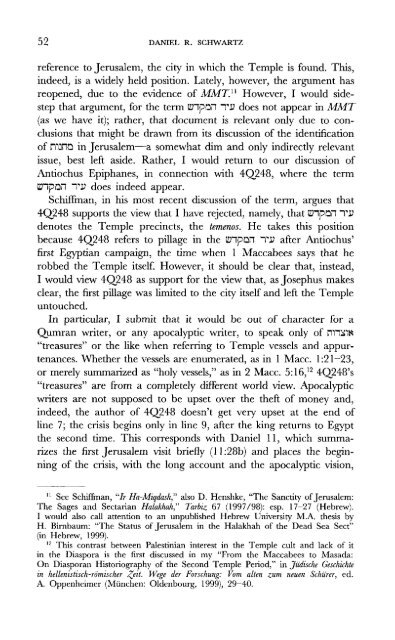historical perspectives: from the hasmoneans to bar kokhba in light ...
historical perspectives: from the hasmoneans to bar kokhba in light ...
historical perspectives: from the hasmoneans to bar kokhba in light ...
You also want an ePaper? Increase the reach of your titles
YUMPU automatically turns print PDFs into web optimized ePapers that Google loves.
52 DANIEL R. SCHWARTZ<br />
reference <strong>to</strong> Jerusalem, <strong>the</strong> city <strong>in</strong> which <strong>the</strong> Temple is found. This,<br />
<strong>in</strong>deed, is a widely held position. Lately, however, <strong>the</strong> argument has<br />
reopened, due <strong>to</strong> <strong>the</strong> evidence of MMT. 11 However, I would sidestep<br />
that argument, for <strong>the</strong> term does not appear <strong>in</strong> MMT<br />
(as we have it); ra<strong>the</strong>r, that document is relevant only due <strong>to</strong> conclusions<br />
that might be drawn <strong>from</strong> its discussion of <strong>the</strong> identification<br />
of <strong>in</strong> Jerusalem—a somewhat dim and only <strong>in</strong>directly relevant<br />
issue, best left aside. Ra<strong>the</strong>r, I would return <strong>to</strong> our discussion of<br />
Antiochus Epiphanes, <strong>in</strong> connection with 4Q248, where <strong>the</strong> term<br />
does <strong>in</strong>deed appear.<br />
Schiffman, <strong>in</strong> his most recent discussion of <strong>the</strong> term, argues that<br />
4Q248 supports <strong>the</strong> view that I have rejected, namely, that<br />
denotes <strong>the</strong> Temple prec<strong>in</strong>cts, <strong>the</strong> temenos. He takes this position<br />
because 4Q248 refers <strong>to</strong> pillage <strong>in</strong> <strong>the</strong> after Antiochus'<br />
first Egyptian campaign, <strong>the</strong> time when 1 Maccabees says that he<br />
robbed <strong>the</strong> Temple itself. However, it should be clear that, <strong>in</strong>stead,<br />
I would view 4Q248 as support for <strong>the</strong> view that, as Josephus makes<br />
clear, <strong>the</strong> first pillage was limited <strong>to</strong> <strong>the</strong> city itself and left <strong>the</strong> Temple<br />
un<strong>to</strong>uched.<br />
In particular, I submit that it would be out of character for a<br />
Qumran writer, or any apocalyptic writer, <strong>to</strong> speak only of<br />
"treasures" or <strong>the</strong> like when referr<strong>in</strong>g <strong>to</strong> Temple vessels and appurtenances.<br />
Whe<strong>the</strong>r <strong>the</strong> vessels are enumerated, as <strong>in</strong> 1 Macc. 1:21-23,<br />
or merely summarized as "holy vessels," as <strong>in</strong> 2 Macc. 5:16, 12 4Q248's<br />
"treasures" are <strong>from</strong> a completely different world view. Apocalyptic<br />
writers are not supposed <strong>to</strong> be upset over <strong>the</strong> <strong>the</strong>ft of money and,<br />
<strong>in</strong>deed, <strong>the</strong> author of 4Q248 doesn't get very upset at <strong>the</strong> end of<br />
l<strong>in</strong>e 7; <strong>the</strong> crisis beg<strong>in</strong>s only <strong>in</strong> l<strong>in</strong>e 9, after <strong>the</strong> k<strong>in</strong>g returns <strong>to</strong> Egypt<br />
<strong>the</strong> second time. This corresponds with Daniel 11, which summarizes<br />
<strong>the</strong> first Jerusalem visit briefly (ll:28b) and places <strong>the</strong> beg<strong>in</strong>n<strong>in</strong>g<br />
of <strong>the</strong> crisis, with <strong>the</strong> long account and <strong>the</strong> apocalyptic vision,<br />
11 See Schiffman, "Ir Ha-Miqdash" also D. Henshke, "The Sanctity of Jerusalem:<br />
The Sages and Sectarian Halakhah," Tarbiz 67 (1997/98): esp. 17-27 (Hebrew).<br />
I would also call attention <strong>to</strong> an unpublished Hebrew University M.A. <strong>the</strong>sis by<br />
H. Birnbaum: "The Status of Jerusalem <strong>in</strong> <strong>the</strong> Halakhah of <strong>the</strong> Dead Sea Sect"<br />
(<strong>in</strong> Hebrew, 1999).<br />
12 This contrast between Palest<strong>in</strong>ian <strong>in</strong>terest <strong>in</strong> <strong>the</strong> Temple cult and lack of it<br />
<strong>in</strong> <strong>the</strong> Diaspora is <strong>the</strong> first discussed <strong>in</strong> my "From <strong>the</strong> Maccabees <strong>to</strong> Masada:<br />
On Diasporan His<strong>to</strong>riography of <strong>the</strong> Second Temple Period," <strong>in</strong> Judische Geschichte<br />
<strong>in</strong> hellenistisch-romischer Zeit. Wege der Forschung: Vom alten zum neuen Schurer, ed.<br />
A. Oppenheimer (Munchen: Oldenbourg, 1999), 29-40.

















